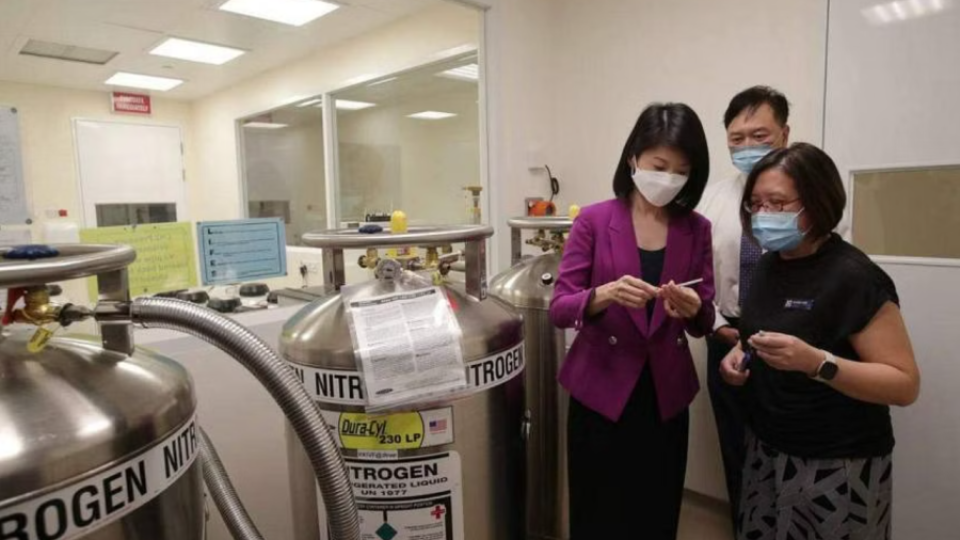May 16, 2023
SINGAPORE – The age limit for women to freeze their eggs to preserve their fertility will be raised from 35 to 37 when elective egg freezing is implemented in Singapore by July 1.
The change comes after a review of local and international research showed that the success rates of egg freezing and subsequent usage of frozen eggs remain relatively stable for women up to 37 years of age.
Minister of State for Social and Family Development Sun Xueling announced the change during a visit to KK Women’s and Children’s Hospital’s (KKH) in-vitro fertilisation centre on Monday.
Ms Sun noted that she had said in 2022 that the authorities would continue looking at medical research and speaking to medical practitioners, even after it had set the age limit of 35 when it allowed elective egg freezing.
She said there is now “sufficient confidence” to raise the age limit after reviewing the medical research and gaining consensus from assisted reproduction practitioners that the success rate of elective egg freezing and babies born from the procedure remains stable up to age 37.
However, a review of medical evidence has shown that the success rate of using eggs from women older than 37 continues to fall, said a press statement by the Ministry of Social and Family Development and Ministry of Health on Monday.
In March 2022, it was announced that women – regardless of their marital status – who were aged between 21 and 35 would be allowed to undergo elective egg freezing, which is done for non-medical reasons.
This was a major policy shift as part of the White Paper on Singapore Women’s Development.
During the 2022 parliamentary debate on elective egg freezing, Ms Sun said the age limit of 35 was in line with the age limit for egg donors, which was also 35.
The age limit was based on international scientific evidence and professional consensus that egg quality declined significantly after 35.
The further the Government extended the age limit, the further the success rate would fall, she said in 2022, noting that she had received many e-mails from women who were concerned about the age limit of 35.
The age limit for egg donors will also be raised to 37 by July 1, in line with the change in age limit for elective egg freezing.
Until it comes into effect, women are allowed to freeze their eggs only for medical reasons, such as when they have to undergo chemotherapy, which may adversely affect their fertility.
While singles can undergo elective egg freezing, only legally married couples can use their frozen eggs to try for a baby through in-vitro fertilisation, Ms Sun said when asked on Monday if singles can use their frozen eggs to conceive.
The procedure, since it is elective, is also not subsidised by the Government, she said.
Asked as well if the raising of the age limit for elective egg freezing could help tackle Singapore’s fertility woes, Ms Sun said: “I think talking to couples about total fertility rate is not something that actually motivates a couple to decide whether or not to have children.”
But elective egg freezing gives women the option of preserving their fertility and to use that option, when they marry and are ready to have children, she added.
Singapore’s total fertility rate fell to a historic low of 1.04 in 2022.
Egg freezing, which is performed at a fertility centre, preserves fertility as the age of the eggs remains unchanged from the moment they are frozen.
Associate Professor Sadhana Nadarajah, head of reproductive medicine at KKH, said the number and quality of eggs decline as a woman ages, and there is a decline in both quantity and quality from the age of 35.
Getting enough good-quality eggs from women aged 38 and older that will give them a reasonable chance of having a baby is challenging, she said.
“In fact, most women at the age of 40, I would advise: Don’t even think about it as the chances are almost zero.”
She added that most of the women she sees start to become very concerned and anxious about fertility from the age of 35.
So raising the age limit to 37 gives them adequate time to think about egg freezing, with a “reasonably good chance” of having a baby using the frozen eggs, she said.
Tampines GRC MP Cheng Li Hui had asked for the age limit to be raised to 40 when she spoke in Parliament in 2022 during the debate on the White Paper.
On Monday, she cheered the move to raise the age limit.
She said: “Yesterday, we celebrated Mother’s Day. Today, we continue celebrating with an even larger group of aspiring mothers who will be eligible for elective egg freezing.”


